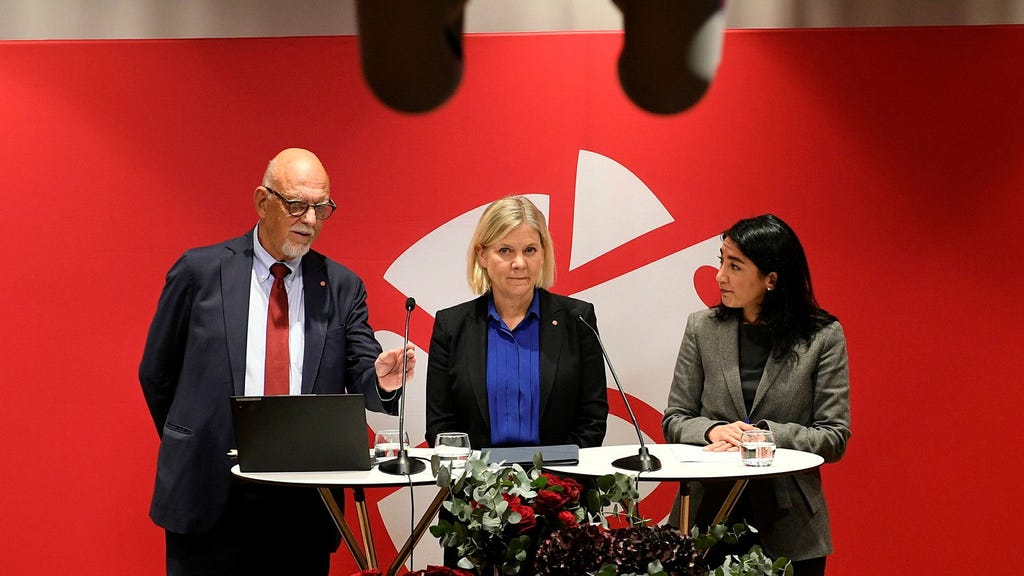The Swedish Social Democratic Party (Socialdemokraterna, or S), under the leadership of Magdalena Andersson, is embarking on a renewal process, marked by a new party platform, aimed at revitalizing the party and preparing for the next general election. Their stated goal is to become a ”more straightforward, clearer, and more decisive” political force. This comprehensive transformation aims to address several key areas, including strengthening the welfare state, tackling climate change, promoting economic equality, and addressing societal challenges such as crime and integration. The party acknowledges the need to regain public trust and reconnect with voters who may have drifted away in recent years.
The new party platform represents a significant shift in strategy for the Social Democrats. It builds upon the party’s historical commitment to social justice and equality, while acknowledging the evolving needs of a modern Swedish society. The platform emphasizes a stronger focus on concrete action and tangible results, moving beyond general pronouncements and focusing on delivering on promises. Andersson has stressed the importance of clear communication and transparent decision-making processes to ensure that the party’s message resonates with voters and builds confidence in their ability to govern effectively. The emphasis on “straightforwardness” signals a move away from perceived political maneuvering and towards a more direct and honest approach to political discourse.
A central pillar of the renewed Social Democratic platform is the reinforcement of the welfare state. This includes investments in healthcare, education, and social security, ensuring that all citizens have access to quality public services. The party recognizes the strain on the welfare system caused by demographic changes and economic pressures, and commits to finding sustainable solutions to ensure its long-term viability. This commitment extends to improving working conditions and strengthening worker protections, building on the party’s historical ties to the labor movement. The party sees a robust welfare state as essential not only for social cohesion but also for economic competitiveness, arguing that a healthy and well-educated population is a prerequisite for a thriving economy.
Another key area of focus is climate change. The Social Democrats acknowledge the urgency of addressing this global challenge and propose ambitious targets for reducing greenhouse gas emissions. The party advocates for a green transition that creates new jobs and economic opportunities while ensuring a just and equitable transition for all segments of society. This includes investments in renewable energy, sustainable transportation, and green technologies. The party also emphasizes the importance of international cooperation in addressing climate change, recognizing that this is a global challenge that requires collaborative solutions. The goal is to position Sweden as a leader in the fight against climate change while simultaneously ensuring sustainable economic growth.
Addressing economic inequality is another central theme of the renewed platform. The Social Democrats recognize the growing gap between the rich and the poor and propose measures to redistribute wealth and opportunity more equitably. This includes progressive taxation, investments in education and job training, and policies that promote fair wages and working conditions. The party aims to create a society where everyone has a fair chance to succeed, regardless of their background or circumstances. This focus on economic justice is seen as crucial not only for social cohesion but also for long-term economic stability and growth. The party argues that a more equal society is a more prosperous society.
Finally, the party also addresses societal challenges such as crime and integration. The platform acknowledges the concerns of citizens regarding rising crime rates and proposes concrete measures to improve public safety. This includes strengthening law enforcement, investing in crime prevention programs, and addressing the root causes of crime, such as poverty and social exclusion. The party also emphasizes the importance of successful integration for newcomers, promoting policies that facilitate language acquisition, cultural exchange, and access to education and employment opportunities. The goal is to create a more inclusive and cohesive society where everyone feels a sense of belonging and has the opportunity to contribute to the common good. The Social Democrats believe that addressing these challenges effectively is crucial for maintaining social stability and building a stronger society for all. They recognize that these are complex issues requiring multifaceted solutions and a collaborative approach involving various stakeholders. The party’s commitment to these areas underscores its aim to create a society that is not only prosperous but also just, equitable, and secure for all its citizens.














